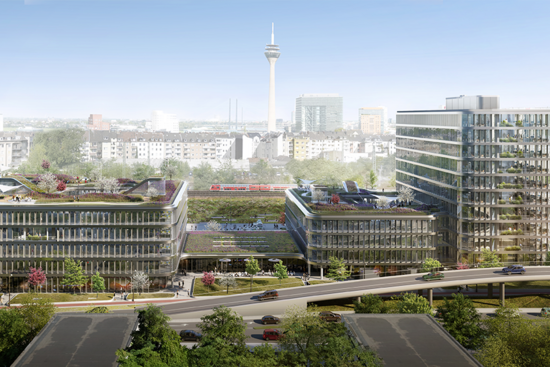Lödige Industries is providing an innovative hybrid solution for the MIZAL Campus at Düsseldorf's Medienhafen, combining a conventional underground car park with a fully automated parking system.
Automated parking systems allow more efficient storage of cars on a relatively small footprint. In order to create the number of parking spaces required for this project designed by the Dusseldorf architects Eller + Eller, a modern, compact automated system was developed, which provides 285 fully automated parking spaces in addition to the 241 conventional parking spaces. Thanks to the parking system, the entire excavation cube could be reduced and a maximum excavation depth of 13.5m ensured - utilising only 55% of the space required by a conventional parking system. A purely conventional system would therefore not have been possible on the existing footprint. Upon completion in 2021, the project will have a total of 526 parking spaces.
“The fully automated parking system provides an efficient solution to deal in a responsible manner with scarce space at locations that are highly sought after like our media harbour. For that reason, I am very pleased that a fully automated parking system of this size will be realized and assume a pioneering role beyond the city boundaries,” the Mayor of Dusseldorf, Thomas Geisel, said.
"We are grateful and honored to be able to support CODIC Development in this important strategic project that will mark a milestone in the future development of office and administrative buildings in Germany,” Dr. Lukas Kopecki, Head of Sales Car Park Systems at Lödige Industries, said.
Robert Bawn, Director Car Parking Solutions at Lödige Industries said: "This order once again confirms our market and technology leadership, especially in complex projects. Our aim is not only to implement our customer's technical goals, but also to create attractive user experiences and enable new sustainable and intelligent urban living spaces.”
Client, Codic Development GmbH, is known for developing prestigious office properties that deliver sustainable value to users and owners. Recent projects include the BonnJour in Bonn and the BO69 in Düsseldorf. As the owner of the MIZAL project, which is being built in Plockstrasse, Codic was looking for a modern system that can handle peak times in the storage and retrieval of vehicles. Here, Lödige Industries has an impressive track record: in 2015 Lödige completed Europe's largest fully automated system with almost 1,000 parking spaces and excellent waiting times of less than 120 seconds
Guido Knümann, Managing Director of Codic Development said: "Codic wants to create work spaces of the future and use unconventional approaches to develop flexible and innovative building concepts that continuously adapt to social and digital developments." With Lödige Industries, we have found a partner that enables to pair technology with architectural design. The combination of speed, quality, and precision of hardware installed and state-of-the-art intelligent and self-learning software was a key factor in the provider's choice. As a solution for urban space constraints, this is a lighthouse-style project."
Lödige Industries will also be responsible for the long-term service for the new system. With a term of 15 years, the parking system in Düsseldorf is remotely monitored by the Lödige Industries Customer Care Centre. If necessary, corrections in the system can be undertaken quickly and efficiently.
Philippe De Backer, CEO of Lödige Industries commented, "Our experience from the more than 60 automatic parking systems that we have installed worldwide, has consistently shown that this allows us to increase the reliability and safety of the system, while reducing operations and maintenance costs."
The MIZAL Campus is planned in such a way that the object offers the greatest possible adaptability to changing work processes. For example, up to 3,200 m² of space are offered without any necessary subdivisions. There are also walk-in and green roof landscapes and a closed-cavity façade, whose closed chambers give the building more energy efficiency and sustainability.

